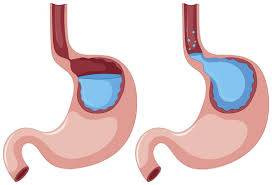Gastroesophageal reflux disease (GERD) is a common condition characterized by the backward flow of stomach acid into the esophagus, causing irritation and discomfort. Here are 20 potential causes, signs and symptoms, effects, and solutions related to GERD:
**Causes:**
1. **Hiatal Hernia:** A hiatal hernia can contribute to GERD by allowing the stomach to move into the chest cavity.
2. **Obesity:** Excess body weight can increase abdominal pressure, pushing stomach contents into the esophagus.
3. **Smoking:** Smoking can weaken the lower esophageal sphincter (LES), which normally prevents acid reflux.
4. **Alcohol:** Excessive alcohol consumption can relax the LES and increase acid reflux.
5. **Fatty Foods:** High-fat meals can slow digestion, promoting acid reflux.
6. **Pregnancy:** Hormonal changes and increased abdominal pressure during pregnancy can lead to GERD.
7. **Certain Medications:** Some drugs, like calcium channel blockers and antihistamines, can relax the LES.
8. **Citrus and Tomato Products:** Citrus fruits and tomatoes are acidic and can trigger symptoms.
9. **Spicy Foods:** Spicy meals can irritate the esophagus and worsen GERD.
10. **Peppermint and Chocolate:** These can relax the LES and contribute to reflux.
11. **Eating Before Bed:** Consuming large meals or snacks close to bedtime can increase the risk of nighttime GERD symptoms.
12. **Tight Clothing:** Wearing tight belts or garments can increase abdominal pressure.
13. **Lying Down After Eating:** Gravity helps keep stomach contents down when you're upright, so lying down too soon after eating can trigger reflux.
14. **Stress:** Chronic stress may worsen GERD symptoms.
15. **Delayed Stomach Emptying:** Conditions like gastroparesis can lead to GERD.
16. **Coffee and Caffeinated Beverages:** These can relax the LES and stimulate acid production.
17. **Carbonated Drinks:** The carbonation can expand the stomach and increase pressure on the LES.
18. **Inhaling Irritants:** Smoking and inhaling secondhand smoke can irritate the esophagus.
19. **Family History:** Genetics may play a role in susceptibility to GERD.
20. **Consuming Large Meals:** Overeating can increase pressure on the LES.
**Signs and Symptoms:**
1. **Heartburn:** A burning sensation in the chest or throat.
2. **Regurgitation:** The sensation of stomach contents or acid moving up into the mouth.
3. **Chest Pain:** May mimic heart-related chest pain.
4. **Dysphagia:** Difficulty swallowing or a feeling of food sticking in the throat.
5. **Chronic Cough:** GERD can cause irritation in the airways.
6. **Hoarseness:** Irritation to the vocal cords can lead to a raspy voice.
7. **Sore Throat:** Frequent acid exposure can irritate the throat.
8. **Bitter Taste in Mouth:** Regurgitated stomach acid can leave a sour or bitter taste.
9. **Wheezing:** GERD can trigger asthma-like symptoms.
10. **Excessive Saliva:** Some people may experience increased saliva production.
11. **Bad Breath:** Acid reflux can contribute to halitosis.
12. **Nausea:** Occasional nausea or vomiting may occur.
13. **Laryngitis:** Inflammation of the voice box can cause voice changes.
14. **Asthma Symptoms:** GERD can worsen asthma in some individuals.
15. **Dental Problems:** Erosion of tooth enamel can occur due to acid exposure.
16. **Difficulty Sleeping:** Nighttime GERD symptoms can disrupt sleep.
17. **Chronic Belching:** Frequent burping may be a symptom.
18. **Chest Pressure:** Some describe GERD-related chest discomfort as pressure.
19. **Excessive Throat Clearing:** A persistent need to clear the throat.
20. **Chronic Fatigue:** Poor sleep quality from GERD can lead to fatigue.
**Effects:**
1. **Esophagitis:** Inflammation and damage to the esophagus lining.
2. **Barrett's Esophagus:** A precancerous condition that can develop in response to chronic GERD.
3. **Esophageal Strictures:** Narrowing of the esophagus due to scarring.
4. **Respiratory Problems:** Aspiration of stomach contents can lead to lung issues.
5. **Esophageal Cancer:** In rare cases, long-term GERD can increase the risk of cancer.
**Solutions:**
1. **Lifestyle Changes:** Maintain a healthy weight, avoid trigger foods, and eat smaller, more frequent meals.
2. **Elevate Head While Sleeping:** Raise the head of your bed or use a wedge pillow.
3. **Medications:** Over-the-counter antacids, H2 blockers, and proton pump inhibitors can help.
4. **Avoid Late-Night Eating:** Finish eating at least 2-3 hours before bedtime.
5. **Smoking Cessation:** Quit smoking to reduce LES relaxation.
6. **Limit Alcohol and Caffeine:** Reduce or eliminate alcohol and caffeine intake.
7. **Stress Management:** Practice stress-reduction techniques.
8. **Dietary Modifications:** Work with a healthcare professional to identify and eliminate trigger foods.
9. **Prescription Medications:** Your doctor may prescribe stronger acid-suppressing medications.
10. **Surgery:** In severe cases, surgical options like fundoplication may be considered.
Remember that GERD management should be personalized based on your specific symptoms and needs. Consult a healthcare professional for a proper diagnosis and treatment plan.



No comments yet
Be the first to share your thoughts!